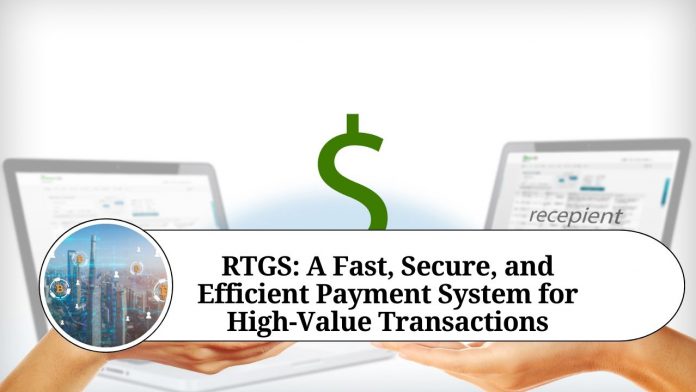INTRODUCTION
The Real-Time Gross Settlement (RTGS) system is a financial transaction processing system that was introduced by the Reserve Bank of India (RBI) in March 2004. The RTGS system allows for large-value fund transfers between banks on a real-time basis. This system is widely used by businesses and individuals who need to transfer large sums of money quickly and securely.
The RTGS system is considered to be one of the most efficient and reliable payment systems in the world. It is designed to facilitate high-value transactions with minimal delay and maximum security. The system operates on a 24×7 basis, meaning that transactions can be initiated and settled at any time of the day, including weekends and holidays.
The RTGS system is used by banks to transfer funds between themselves or to their clients. The system can be used to transfer funds for a variety of purposes, including payment of bills, purchase of goods and services, and transfer of funds for investment purposes.
To use the RTGS system, both the sender and the receiver must have accounts with banks that are connected to the system. The sender must provide the receiver’s account details, including the bank name, account number, and IFSC code, along with the amount to be transferred. The sender’s bank then processes the transaction and sends the funds to the receiver’s bank, which credits the receiver’s account immediately.
The RTGS system has several advantages over other payment systems. First, it is faster and more efficient than other payment systems, such as NEFT (National Electronic Funds Transfer) and IMPS (Immediate Payment Service). Second, it is more secure than other payment systems because it operates on a real-time basis, which minimizes the risk of fraud and error. Third, it is more convenient than other payment systems because it allows for 24×7 transactions, which means that transactions can be initiated and settled at any time of the day.
One of the key benefits of the RTGS system is its ability to process high-value transactions quickly and securely. This is particularly important for businesses and individuals who need to transfer large sums of money for time-sensitive purposes, such as paying for goods and services or making investments. The RTGS system enables these transactions to be completed in a matter of seconds, reducing the risk of delays and errors.
Another important advantage of the RTGS system is its reliability. The system is designed to be highly resilient and secure, with multiple layers of encryption and authentication to ensure that transactions are processed accurately and securely. The system is also subject to strict regulatory oversight, with the RBI monitoring all transactions to prevent fraud and other financial crimes.
In addition to its reliability and security, the RTGS system is also highly efficient. The system is fully automated, with no manual intervention required to process transactions. This means that transactions can be initiated and settled quickly and with minimal errors, reducing the need for manual reconciliation and other administrative tasks.
The RTGS system has also played a key role in promoting financial inclusion in India. By enabling 24×7 transactions and providing a reliable and secure platform for high-value transfers, the system has made it easier for individuals and businesses in rural and remote areas to participate in the formal financial system. This has helped to increase access to credit, improve financial literacy, and promote economic development in these areas.
Conclusion
Overall, the RTGS system has been a major success for the Indian financial system. It has enabled faster, more secure, and more efficient transfers of high-value transactions, while also promoting financial inclusion and economic development. The system will likely continue to evolve and improve in the coming years, as new technologies and regulatory frameworks emerge to meet the changing needs of businesses and individuals in India and beyond.
Other Related Blogs: Section 144B Income Tax Act
Frequently Asked Questions (FAQs)
Q: What is RTGS?
A: RTGS stands for Real-Time Gross Settlement. It is a payment system that enables high-value fund transfers between banks on a real-time basis.
Q: When was RTGS introduced in India?
A: The RTGS system was introduced by the Reserve Bank of India (RBI) in March 2004.
Q: What is the minimum and maximum amount that can be transferred through RTGS?
A: The minimum amount that can be transferred through RTGS is Rs. 2 lakh, and there is no maximum limit.
Q: Can individuals use RTGS to transfer funds?
A: Yes, individuals can use RTGS to transfer funds, but they must have accounts with banks that are connected to the system.
Q: Is there a fee for using RTGS?
A: Yes, banks may charge a fee for using the RTGS system. The fee varies depending on the amount of the transaction and the bank’s policies.
Q: What is the processing time for RTGS transactions?
A: RTGS transactions are processed in real-time, meaning that they are settled immediately.
Q: What is the cut-off time for RTGS transactions?
A: The cut-off time for RTGS transactions varies by bank, but it is typically between 4:30 PM and 6:00 PM on weekdays and 12:30 PM on Saturdays.
Q: Can RTGS transactions be cancelled or reversed?
A: RTGS transactions cannot be cancelled or reversed once they have been initiated.
Q: Is RTGS more secure than other payment systems?
A: Yes, RTGS is considered to be one of the most secure payment systems in the world because it operates on a real-time basis and uses multiple layers of encryption and authentication to ensure that transactions are processed accurately and securely.
Q: How has RTGS promoted financial inclusion in India?
A: RTGS has promoted financial inclusion in India by enabling 24×7 transactions and providing a reliable and secure platform for high-value transfers. This has made it easier for individuals and businesses in rural and remote areas to participate in the formal financial system, thereby increasing access to credit, improving financial literacy, and promoting economic development.




















